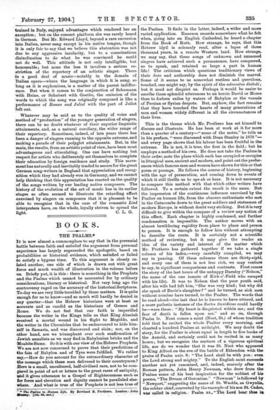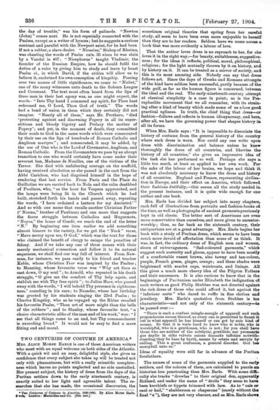BOOKS.
IT is now almost a commonplace to say that in the perennial battle between faith and unbelief the argument from personal experience has largely superseded the apologetic, based on probabilities or historical evidence, which satisfied or failed to satisfy a bygone time. To this argument is closely re- lated another, one side of which is drawn out with great force and much wealth of illustration in the volume before es. Briefly put, it is this : there is something in the Prophets and the Psalms which cannot be accounted for by ordinary considerations, literary or historical. Not very long ago the controversy raged on the accuracy of the historical Scriptures. To-day we are very little troubled by these matters. It is quite enough for us to know—and so much will hardly be denied in any quarter—that the Hebrew historians were at least as accurate and as candid as the historians of Greece and Rome. We do not feel that our faith is imperilled because the writer in the Kings tells us that King Ahaziah received a mortal wound in his flight to Megiddo, and the writer in the Chronicles that he endeavoured to hide him- self in Samaria, and was discovered and slain; nor, on the other hand, are we triumphant over such confirmation of Jewish annalists as we may find in Babylonian bricks and the Moabite Stone. So it is with our view of the Hebrew Prophets. We are not now concerned to prove that their predictions of the fate of Babylon and of Tyre were fulfilled. We rather say,—How do you account for the extraordinary character of the message which these men delivered to their countrymen ? Here is a small, uncultured, half-civilised race, not to be corn- pared in in point of art or letters to the great races of antiquity, slid it gives utterance to a Gospel of Righteousness such as for force and elevation and dignity cannot be paralleled else- where. And what is true of the Prophets is not less true of • Th. Psalms in Hunnus Life. By Rowland E. Prothitro. London: John ernessy. floa eict. set.] the Psalms. It finds in the latter, indeed, a wider and more varied application. Emerson records somewhere what he felt when, going into an English Cathedral, he heard a chapter from the Book of Ruth. How strange, he says, that this Hebrew idyll is solemnly read, after a lapse of three thousand years, in a remote Western land. How strange, we may say, that these songs of unknown and unnamed singers have achieved such a permanence, have conquered, so to speak, and retained so large a part in human life ! The criticism which questions traditionary views of their date and authorship does not diminish the marvel. Some of it seems to us somewhat restless and querulous, touched, one might say, by the spirit of the advocatus diaboli ; but it need not disquiet us. Perhaps it would be easier to ascribe these splendid utterances to an heroic David or Moses than to forlorn exiles by waters of Babylon or the vassals of Persian or Syrian despots. But, anyhow, the fact remains that they have touched the hearts of many generations of men and women widely different in all the circumstances of their lives.
This is the theme which Mr. Prothero has set himself to discuss and illustrate. He has been at work at it for more than a quarter of a century—" some of the notes," he tells us in his preface, "were discussed with Dean Stanley in 1878 "— and every page shows that his labour has been fruitful in the extreme. He is not, it is true, the first in the field ; but he employs a method of his own. He does not take the Psalms in their order, note the place which each has occupied or occupies in liturgical uses, ancient and modern, and point out the prefer- ences which famous men and women have shown for this or that poem or passage. He follows the course of history, beginning with the age of persecution, and coming down to events of which it still thrills us to spe ak or hear. It is not necessary to compare this method with that which other writers have followed. To a certain extent the result is the same. But the impression of the continuous influence exercised by the Psalter on human life, from the obscure enthusiasts who met in the Catacombs down to the great soldiers and statesmen of modern Europe, is without doubt very striking. But it is very difficult to give within the compass of a review any notion of this effect. Each chapter is highly condensed, and further condensation is impossible. The author moves with an almost bewildering rapidity from place to place and person to person. It is enough to follow him without attempting to describe the route. It is certainly not a scientific method of reviewing, but it may give the reader an idea of the variety and interest of the matter which Mr. Prothero has gathered together if we take a single column of his index,—very carefully compiled, we may say in passing. Of these columns there are thirty-eight, and every one of them is not less rich, we may venture to say, in significant comparisons and contrasts. First comes the story of the last hours of the unhappy Darnley ("Nelson," the name of the one inmate of Kirk-o'-Field who escaped with his life). It was to Nelson that the poor youth said, after his wife had left him, "She was very kind ; but why did she speak of Davie's slaughter ? " and he turned, as sick men without number have turned, to the Psalter. The words that he read aloud—the last that he is known to have uttered, and a more pathetic instance of the Sortes Davidicae could hardly be—were these : "My heart is disquieted within me ; and the fear of death is fallen upon me," and so On, through Psalm lv. Next comes a saint (Neot, St.) of whom tradition told that he recited the whole Psalter every morning, and chanted a hundred Psalms at midnight. We may doubt the story, for the Psalter is about equal in length to five books of the Aeneid, and certainly could not be recited in as many hours ; but we recognise the nurture of a vigorous spiritual life, nor do we wonder that it was St. Neot who appeared to King Alfred on the eve of the battle of Ethendun with the praise of Psalm xxiv. 8: "The Lord shall be with you : even the Lord strong and mighty." To the English saint succeeds another not yet canonised, and, indeed, scarcely after the Roman pattern, John Henry Newman, who drew from the Psalms some of his best inspiration for the noblest of his poems, "The Dream of Gerontius." "Newman" is followed by "Newport," suggesting the name of St. Weolds, as Gwynlin, the robber chief, converted by the example of his son St. Cade°, was called in religion. - Psalm xx., "The Lord bear thee ie.
the day of trouble," was his form of palinode. "Newton (John) " comes next. He is not especially connected with the Psalms, except as a writer of hymns ; but he suggests a curious contrast and parallel with the Newport saint, for he had been if not a robber, a slave-dealer. " Nicasius," Bishop of Rheims, was chanting the words of Psalm crix. 35 when he was slain by a Vandal in 407; " Nicephorus" taught Vladimir, the founder of the Russian Empire, how he should fulfil the duties of a ruler by giving him to study and learn by heart Psalm ci., in which David, if the critics will allow us to believe it, enshrined his own conception of kingship. Passing over two names of little significance, we come to "Nisbet," one of the many witnesses unto death to the Solemn League and Covenant. The text most often heard from the lips of these men in their last agony was, as one might expect, the
words: "Into Thy hand I commend my spirit, for Thou haat redeemed me, 0 Lord, Thou God of truth." The words had a bond of union in them which they certainly did not imagine. "Nearly all of them," says Mr. Prothero, "died 'protesting against and disowning Popery in all its super- stitions and bloody bigotry and Prelacy the mother of Popery' ; and yet, in the moment of death, they committed their souls to God in the same words which were consecrated by their use on the lips of hundreds of Roman Catholic and Anglican martyrs " ; and consecrated, it may be added, by the use of One who is the Lord of Covenanter, Anglican, and Roman Catholic. From the Covenanters we pass by an abrupt transition to one who would certainly have come under their severest ban, Madame de Noailles, one of the victims of the Terror. She died with unfaltering courage on the scaffold, having received absolution as she passed in the cart from the Abbe Carichon, who had disguised himself in the hope of rendering that last service. From Paris and the Place du Guillotine we are carried back to Nola and the calm deathbed of Paulinus, who, "as the hour for Vespers approached, and the lamps were being lit in the Church which he had built, stretched forth his hands and passed away, repeating the words, 'I have ordained a lantern for my Anointed." And so with one name that recalls another Christian Father (" Nonna," brother of Paulinus) and one more that suggests the fierce struggle between Catholics and Huguenots, "Noyes," the home of Conde, we reach the end of the letter "N." By beginning one item earlier we add something almost bizarre to the variety, for we get the " Neck " ve se, " Have mercy upon me, 0 God," which was the text for those who claimed the benefit of clergy to escape the penalties of felony. And if we take any one of these names with their merely mechanical connection and follow it to its natural sequences, we shall find our way full of interest. From New- man, for instance, we pass easily to his friend and teacher Keble, whose Christian Year was inspired by the Psalter ; to Manning, whose favourite verse was "Why art thou so cast down, 0 my soul " ; to Arnold, who repeated in his death struggle, "0 give me the comfort of Thy help again, and stablish me with Thy free spirit " ; to Julius Hare, who passed away with the words, "I will behold Thy presence in righteous- ness," sounding in his ears ; to Neander, whose last birthday was greeted by his students singing the 23rd Psalm ; to Charles Kingsley, who as he voyaged up the Rhine recalled his favourite Psalm, "Thou art of more might than the bells of the robbers " ; and to Stanley, whose favourite text, "a choice characteristic alike of the man and of his work," was: "I see that all things come to an end, but Thy commandment is exceeding broad." It would not be easy to find a more Atting end and moral.











































 Previous page
Previous page